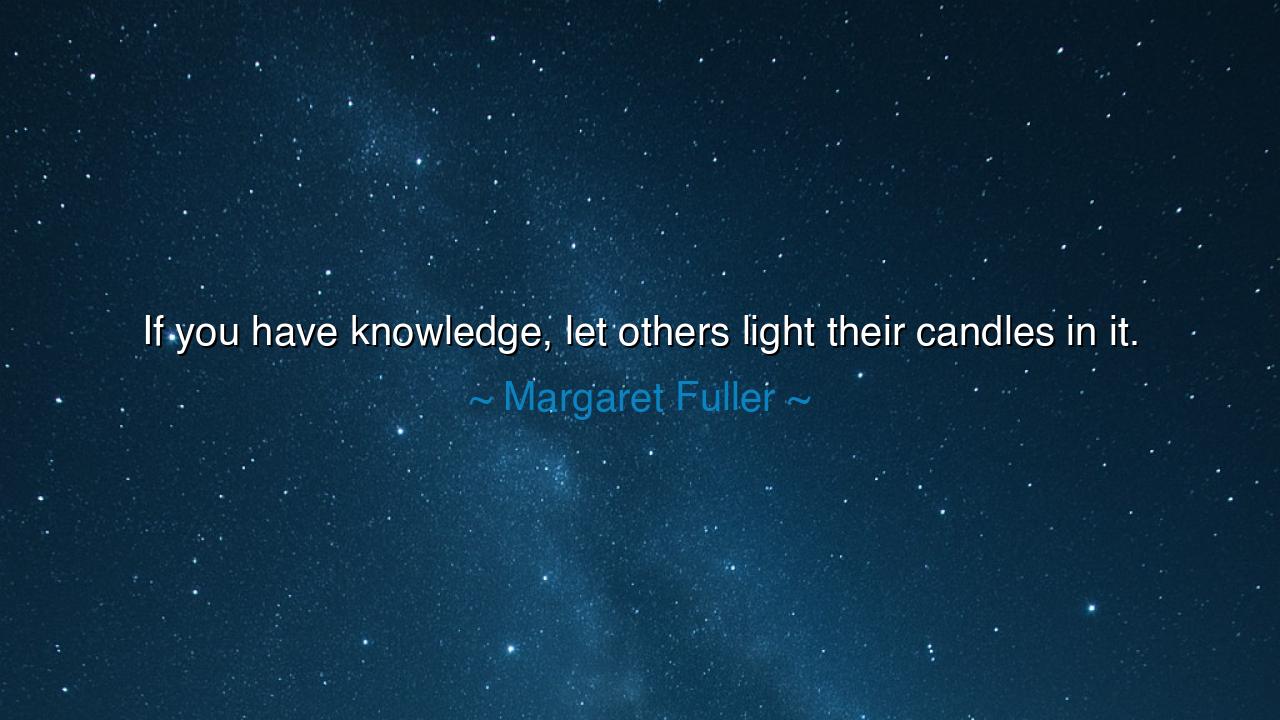
If you have knowledge, let others light their candles in it.






Hear the luminous words of Margaret Fuller, who declared: “If you have knowledge, let others light their candles in it.” This saying is a call to generosity of the spirit, a reminder that knowledge is not meant to be hoarded like treasure in a locked chest, but shared like a flame that spreads warmth and light. The one who keeps knowledge to themselves dwells in solitary brightness, but the one who shares becomes the source of a thousand shining lamps, filling the world with brilliance.
The meaning of this teaching is rooted in the very nature of knowledge. Knowledge is not diminished by sharing; it is multiplied. A candle that lights another does not lose its flame, but together they push back the darkness more fully. Fuller, who lived in the age of American transcendentalism, believed in the power of ideas to lift souls and transform societies. To her, the highest use of knowledge was not self-exaltation, but service—to allow others to see further, to grow stronger, and to continue the chain of enlightenment.
History gives us noble examples of this principle. Consider the ancient Library of Alexandria, built as a treasury of human knowledge. Though lost to fire and time, its spirit endured in the countless scrolls and manuscripts carried outward into the world. Scholars who shared their writings became the foundation of civilizations, their words lighting candles long after their own lamps had burned out. So too with Gutenberg’s printing press, which allowed wisdom to escape the hands of the few and spread to the many. When knowledge was shared, empires of thought arose, and ignorance was driven back.
Yet the opposite is also true: when knowledge is withheld, humanity suffers. Think of the medieval ages when learning was locked within monasteries, restricted to the few, while the many groped in the shadows of superstition. The flame was guarded jealously, and so progress slowed. Only when the light of knowledge was shared more freely—in universities, in books, in speech—did humanity awaken to art, science, and reform. Fuller’s words are a rebuke to the spirit of selfishness that seeks to hold power by hiding truth.
The power of this teaching also touches daily life. A teacher who withholds wisdom cripples their students. A master craftsman who refuses to train an apprentice ensures that his art dies with him. But the one who shares freely builds a legacy. Socrates shared his method of questioning; Confucius shared his teachings of virtue; they did not hoard knowledge, yet their influence endures for millennia. So too, when we allow others to light their candles in our flame, our light grows brighter through theirs.
The lesson, then, is clear: if you are blessed with knowledge—whether great or small—do not guard it selfishly. Speak, teach, write, and guide. Let your wisdom become the fire from which others draw strength. Do not fear that you will lose what you share; knowledge is not like gold that diminishes when spent, but like flame that spreads by giving. To refuse others your flame is to let the world remain in shadow when it could blaze with light.
Therefore, beloved seekers, let your practice be this: when you know, teach. When you have learned, share. When you have been enlightened, open your flame to those still walking in the dark. In this way, you honor Fuller’s timeless truth: if you have knowledge, let others light their candles in it. For the measure of your wisdom is not how brightly you shine alone, but how many lights you have kindled in others, until the whole world glows with shared illumination.






AAdministratorAdministrator
Welcome, honored guests. Please leave a comment, we will respond soon